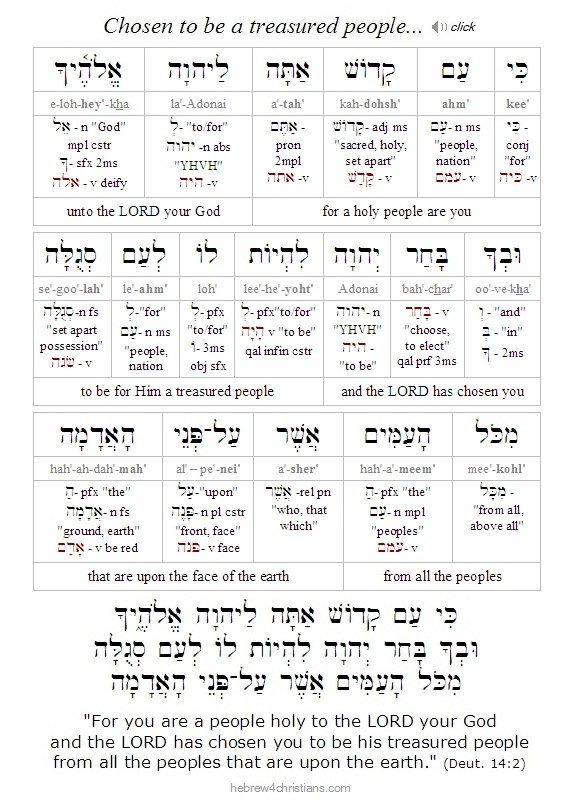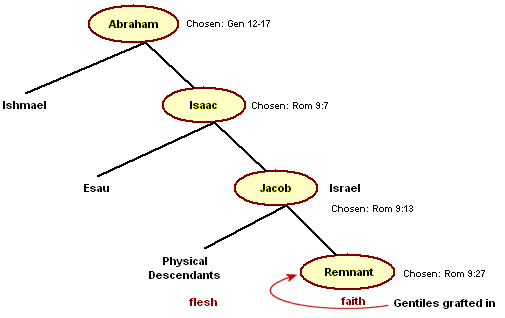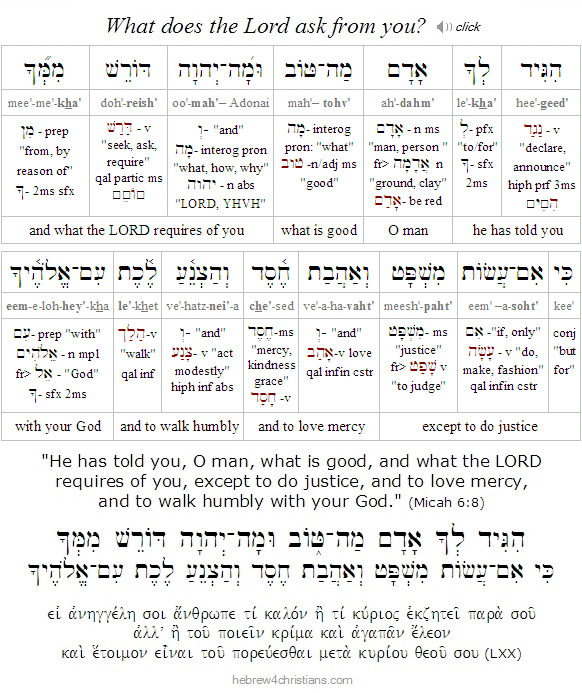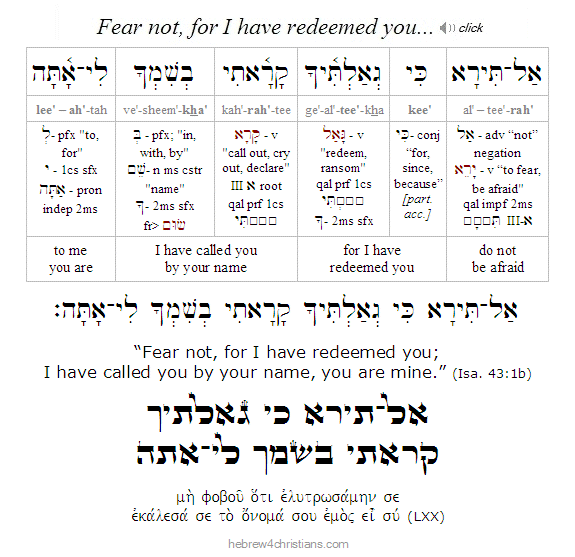|
ONE OF THE GREATEST OF MISTAKES is to forget your beloved status before the LORD... "Fear not, for I have redeemed you; I have called you by name, you are mine" (Isa. 43:1). Forgetting who you are leads to forgetting who the LORD is, just as forgetting who the LORD is leads to forgetting who you are... A passage from our Torah reading this week (i.e., Re'eh) speaks to us along these lines: "You are children of the LORD your God. You shall not cut yourselves or make any baldness on your foreheads for the dead. For you are a people holy to the LORD your God, and the LORD has chosen you to be for him am segulah (עם סגלה) - a treasured people out of all the peoples who are on the face of the earth" (Deut. 14:1-2).
In this verse, Moses reminds the people that since they are children of the LORD they were not to mourn for the dead like those without any hope of life beyond the grave... Our God, the Father of Israel, is eternal, and even if our earthly fathers were to die, we will never be orphans, because the LORD, the Everlasting God who is the "God of the spirits of all flesh" (אֱלהֵי הָרוּחת לְכָל־בָּשָׂר), always watches over us: "He will not let your foot be moved; he who keeps you will not slumber" (Psalm 121:3). But if we forget who we are, if we lose sight of our place in the Heavenly Father's heart, then we are likely to fall into a state of excessive and self-destructive mourning over the losses we experience in this world. In the most tragic cases, this can lead to the darkness of unremedied despair, "living among the tombs, crying out and cutting himself with stones" (Mark 5:5). On the other hand, if remember our place at the Father's table as his children, if we take hold that we are beloved of God - his very own "treasured people" - then we will regard the difficulties we encounter in this world as a test of faith intended for our good (Deut. 8:3,16, Jer. 29:11).
Notice further that this passage states that the people were chosen by the LORD to be his own "possession" (i.e., segulah: סְגֻלָּה) from all other peoples in the earth. The grammar here uses a comparative use of the preposition min, meaning "more than" the other peoples of the earth. This idea was first mentioned when God said to the elders at Sinai, "Now therefore, if you will indeed obey my voice and keep my covenant, you shall be my possession more than all other peoples (סְגֻלָּה מִכָּל־הָעַמִּים), for all the earth is mine; and you shall be to me a kingdom of priests and a holy nation" (Exod. 19:5-6). The truth that the Jewish people were specially chosen to reveal God's salvation and mercy is repeated elsewhere in Scripture, including Mal. 3:17, Psalm 135:4, Deut. 7:6, 26:18. The word segulah essentially means valuable "personal property," guarded for safe keeping, such as David's treasure of gold and silver which he donated to the Temple (1 Chron. 29:3), or Solomon's treasure collected from the kings and provinces (Eccl. 2:8). Undoubtedly God's redeemed people are regarded as a treasured group of people among the nations of the earth...
Hebrew Lesson
Deut. 14:2 Hebrew reading (click):
 |
In addition to being a treasured people (עַם סְגֻלָּה), however, the Jewish people were also called am nivchar (עַם נִבְחָר), a chosen people. But what does this mean? What is the point of being "chosen"? Is "chosenness" simply a matter of being a biological or ethnic descendant of the Jewish patriarchs, or does it mean something more?
In this connection it is helpful to remember that the Hebrew word "Jew" (i.e., yehudi: יְהוּדִי) comes from a root (יָדָה) which means to "thank" or to "praise" (Gen. 29:35). The Apostle Paul alluded to this by saying that a Jew whose heart has been circumcised by the Spirit is "one who is praised by God," not by men (Rom. 2:29). Being a Jew therefore means that you are "chosen" to receive special blessings and grace to live in holiness for the glory of God and for the welfare of the world. The performance of various commandments are for the greater purpose of tikkun olam, the "repair of the world," in order to reveal God's goodness and love. Doing so makes a person a Jew, since his or her praise comes not from man, but from God. God is the source and the power of what makes a true Jew a tzaddik. After all, Israel was meant to be a "light to the nations" (Isa. 42:6; 60:3), and God had always planned for all the families of the earth to come to know Him and give Him glory through Abraham (Gen. 12:3). "Jewishness" is therefore not an end in itself but rather a means to bring healing truth to the nations... Indeed, the entire redemptive story of the Scriptures is about the cosmic conflict to deliver humanity from the "curse" by means of the "Seed of the woman" who would come. Any talk of ancestry, bloodlines, lineage, "chosenness," and so on must be understood as a means to this greater redemptive end.
Indeed a person is never chosen simply on the basis of their genetics or lineage, but because of the personal call and election of God: "For not all who are descended from Israel belong to Israel, and not all are children of Abraham because they are his offspring, but 'through Isaac shall your offspring be named.' This means that it is not the children of the flesh who are the children of God, but the children of the promise are counted as offspring" (Rom. 9:6-8). The idea of chosenness therefore is independent of considerations of "flesh" but is directly related to our response to God's promises.... This was true of "Israel at large" in relation to its faithful subset called she'arit Yisrael (i.e., the faithful remnant), just as it is true of those who embrace the promise of salvation through Yeshua the Messiah.
 |
Therefore the Apostle Peter can refer to followers of Yeshua as "a chosen race, a royal priesthood, a holy nation, a people for his own possession" (1 Pet. 2:9, cp. Exod. 19:6, Deut. 7:6). This is clearly a reference to both Jews and Gentiles who receive Yeshua as their Savior, since he adds: "Once you were not a people (i.e., lo ammi: לא עַמִּי), but now you are God's people; once you had not received mercy (i.e., lo ruchamah: לא רֻחָמָה), but now you have received mercy." (1 Pet. 2:9-10). This echoes the words of the LORD given to the prophet Hosea: "Although it was said to them, "You are not my people," it will be said to them, "You are children of the living God (Hos. 2:23; Rom. 9:25). The Apostle Paul likewise understands Christians to be "chosen people" (Eph. 1:4; 2 Thess. 2:13). Followers of Yeshua are be'kehunat Mashiach - in the priesthood of Messiah Yeshua and therefore have direct access to God (Heb. 4:16, Rev. 1:6). This priestly lineage began with Malki-Tzedek (Melchizedek), to whom Levi gave tithes (Heb. 7:9-10), culminated in Yeshua, and is passed directly to the believer by means of his or her justification and identification with the Lord, "who gave himself for us, that he might redeem us from all iniquity, and purify unto himself a 'peculiar people' (i.e., am segulah: עַם סְגֻלָּה), zealous of good works" (Titus 2:14). The enmity between Jews and Gentiles has been overcome through the sacrificial death of Yeshua the Savior of the world. We are made "one new man" (אִישׁ־אֶחָד חָדָשׁ) because of the unfailing love and salvation of our Lord (Eph. 2:11-16).
Within some groups of Messianic Judaism, non-Jewish believers tend to consider themselves as "outsiders" and "second-class" members in the family of God. They often seem to be self-deprecatory, calling themselves "wild olive shoots," "Gentile believers," or even "ger tzedek" (a righteous convert). This is most unfortunate, since it robs these precious souls of their true identity as co-heirs of the Kingdom (Gal. 3:9; Titus 3:7), and it also destroys the unity that Yeshua sought to bring among God's people (John 17:20-23; Eph. 2:14-15).
While it is indeed true that ancient Israeli society was composed of various classes of people in a hierarchy (priests, Levites, Israelites, women, converts, slaves, outsiders, etc.), it is evident that our Lord Yeshua didn't come to create a "caste system" among His followers. In fact, he turned things upside-down by saying that the "greatest would be the slave of all" (Mark 10:44; Matt. 18:1-4, Matt. 20:25-28). Whoever would be great in the Kingdom must humble himself and walk hatznea lechet - in childlike simplicity before the Lord (Micah 6:8). Yeshua transposed the all-too-human view of social relationships by inverting the "natural" order. Do you "seek great things for thyself"? Then take hold of your absolute nothingness before the LORD and serve your fellow man (Jer. 45:5). Show gratitude for the gift of life and quit your vain conceits.
Hebrew Lesson
Malachi 6:8 Hebrew reading (click):
 |
The Apostle Paul - undoubtedly the greatest Torah sage of the Second Temple period - taught that in the Messiah there "is neither Jew nor Greek, slave nor free, male nor female" since we are all one (echad) in the Messiah (Gal. 3:28). But what does this mean? Despite the egalitarian ideal, don't we use these very distinctions to this day? On a fleshly level we certainly do. After all, we clearly distinguish between men and women, rich and poor, slave and free, and various ethnic identities. We all live with these distinctions in the world of basar - the carnal world that is known through sensuous apprehension. However, "from now on we regard no one according to the flesh" (2 Cor. 5:16) but we aim to understand, with the help of God, that a follower of Yeshua is briah chadashah - a "new creation." In the Spirit of God's love we are ish-echad chadash ("one new man") designed to live in unity. k'ish echad, b'lev echad - "as one person with one heart."
God is said to be no "respecter of persons" (Acts 10:34, Rom. 2:11). He is able to make the unclean clean (Acts 10:28) and to regard those who were once called "Not My People" as "My People" (Hos. 2:23, Matt. 3:9). Indeed, a true Jew is one who is circumcised inwardly, someone who has undergone spiritual brit millah - "covenant of the word" (Deut 10:16, 30:6; Rom. 2:28-29, 1 Cor. 7:19, Gal. 5:6; 6:15; Phil. 3:3, Col. 2:11, etc.). Indeed, Paul insisted that any merit obtained either through his pedigree or his adherence to the moral law code is accounted as less than nothing in comparison to the imputed righteousness given by means of his relationship with Yeshua (Phil. 3:3-8).
Chaverim: Regardless of your ethnic background, or your gender, or your social status in this world, understand that you are am segulah (עַם סְגֻלָּה) - precious and elect, and part of the family of God. Do not "cut yourselves" in mourning or regard yourselves as without hope. You are now Kohanim l'El Elyon - priests of the Ascended God - "like living stones being built up as a spiritual house, to be a holy priesthood, to offer spiritual sacrifices acceptable to God through Yeshua the Messiah" (1 Pet. 2:5).
Hebrew Lesson:
 |
|







